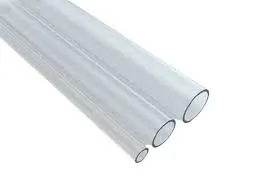des. . 09, 2024 20:19 Back to list
Exploring the Benefits and Uses of HDPE Tubing in Various Applications
Understanding HDPE Tubes Properties, Applications, and Benefits
High-Density Polyethylene (HDPE) tubes are increasingly becoming a preferred choice in various industries due to their remarkable properties and versatility. HDPE, a thermoplastic polymer made from petroleum, is known for its high strength-to-density ratio, making it ideal for applications requiring durability and resistance.
Properties of HDPE Tubes
HDPE tubes are characterized by several beneficial properties that contribute to their wide usage
1. Durability HDPE is highly resistant to impact and does not easily crack or break under stress. This makes HDPE tubes suitable for demanding applications.
2. Chemical Resistance The chemical structure of HDPE provides excellent resistance to a wide range of chemicals, making these tubes ideal for transporting corrosive substances without degradation.
3. Lightweight HDPE tubes are lighter than metal pipes, making them easier to handle and install. This feature reduces transportation costs and labor expenses during installation.
4. Flexibility HDPE tubes maintain a degree of flexibility that allows them to bend without breaking, making them suitable for various layouts and installations.
5. UV Resistance Many HDPE tubes come with UV stabilizers, allowing them to resist degradation from prolonged exposure to sunlight. This property is particularly useful for outdoor applications.
6. Recyclability HDPE is a recyclable material, which makes it an environmentally friendly choice. Used HDPE products can be reprocessed into new items, contributing to sustainability efforts.
Applications of HDPE Tubes
Given its robust properties, HDPE tubes are utilized in a variety of industries
1. Water Supply Systems HDPE pipes are widely used in municipal water supply systems due to their resistance to corrosion, chemicals, and high pressure. They are perfect for both potable water and irrigation systems.
hdpe tube

2. Agricultural Applications In agriculture, HDPE tubing is employed for various purposes, including drip irrigation and drainage systems. Its flexibility allows for efficient layouts that can adapt to the shape of the land.
3. Waste Management HDPE tubes are commonly used in waste management systems, particularly for landfill liners and piping systems. Their chemical resistance ensures that they can handle aggressive waste without leaking.
4. Electrical Conduits HDPE tubing serves as electrical conduits, protecting wiring and cables from external elements. Its non-conductive nature further enhances safety in electrical installations.
5. Industrial Applications Industries frequently use HDPE tubes for transporting chemicals, fluids, and gases due to their strength and chemical resistance. They are also prevalent in manufacturing processes that require lightweight yet durable material.
Benefits of Using HDPE Tubes
The adoption of HDPE tubes comes with various advantages for industries and users
1. Cost-effectiveness The initial investment in HDPE tubes may be higher than traditional materials, but their longevity and reduced maintenance costs lead to significant savings over time.
2. Ease of Installation The lightweight nature of HDPE tubes simplifies transportation and installation. They often come in long lengths, which reduces the number of fittings required, streamlining the process.
3. Reduced Water Loss In water supply and irrigation systems, HDPE tubes are designed to minimize leaks, ensuring efficient water usage and reducing wastage.
4. Improved Flow Rates The smooth interior walls of HDPE tubes lead to lower friction losses, resulting in better flow rates in pipelines.
5. Maintenance-Free HDPE pipes do not require frequent maintenance, as they are resistant to rust, mold, and bacteria. This attribute is particularly beneficial for long-term projects.
In conclusion, HDPE tubes have revolutionized the way we approach piping and tubing across various industries. Their unique properties and significant benefits make them an outstanding choice for applications involving water supply, chemical transport, agricultural needs, and much more. As industries continue to prioritize sustainability and efficiency, the role of HDPE tubes is likely to expand further, solidifying their place in the future of construction and manufacturing.
-
High Quality PVC Soft Sheet for Flexible and Durable Applications
NewsJul.29,2025
-
High-Quality PPR Pipe for Plumbing Systems - Durable & Leak-Proof
NewsJul.29,2025
-
High Quality PVC Round Rod for Industrial & DIY Applications
NewsJul.28,2025
-
High Quality PVC Pipe Fitting - Durable & Leak-Proof Solutions
NewsJul.28,2025
-
High-Quality PVC Rigid Sheet (Glossy Surface) for Industrial Use
NewsJul.26,2025
-
High Quality PVC Rigid Sheet (Embossed Surface) for Industrial Use
NewsJul.25,2025

